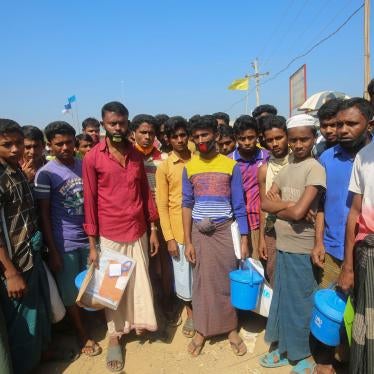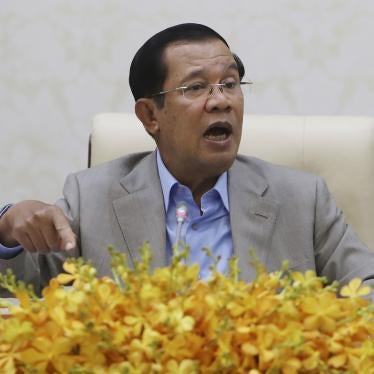The world is being tested by the Covid-19 pandemic, described by United Nations Secretary-General Antonio Guterres as “the most challenging crisis we have faced since the Second World War.” It is a health and human rights crisis on a global scale that has swept across borders, leaving no country untouched, and impacting the lives of millions, many of whom are among the most vulnerable. The human rights consequences, including those that flow from inadequate or unequal access to health care, entrenched inequalities, and the impact of devastated economies, will be felt for years to come.
In April 2020, Human Rights Watch prepared a human rights policy checklist to assist governments in developing effective, rights-respecting responses to the Covid-19 crisis.
The checklist sets out more than 40 questions to guide rights responses across a broad range of areas, including access to affordable health care; to water and sanitation; adequate housing, food and education; while ensuring the safety of those in detention; ensuring access to information; maintaining freedom of expression; closing the digital divide; ensuring emergency powers meet international standards, and addressing the needs of groups most at risk, including people living in poverty, ethnic and religious minorities, women, people with disabilities, older people, LGBT people, migrants, refugees, and children.
Because these issues cannot be addressed in the abstract, in April 2020, our published checklist illustrated the policy questions by reference to both good practices and areas of concern, recognizing that these can be neither prescriptive nor exhaustive.[1]
While some jurisdictions have ensured that states of emergency are time-limited and subject to oversight, Hungary and Cambodia, among others, have adopted state of emergency laws that give the government unlimited powers for an indefinite duration.
While some states have prioritized access to information, government officials in countries including Brazil, Burundi, China, Mexico, Myanmar, the US, and Zimbabwe have exhibited disturbing denialism about Covid-19, depriving their populations accurate information on the pandemic.
In countries including Bangladesh, Cambodia, China, Egypt, and Venezuela, people have been arrested and detained for expressing their opinion about Covid-19 on social media.
Israel’s 13-year-long closure of Gaza means that restrictions on the import of medical supplies, and denial of transit permits for many requiring vital medical treatment outside of Gaza, is impeding the crisis response.
International law is clear that even amid a public health crisis, emergency measures taken by governments that restrict basic rights must be lawful, necessary, and proportionate. Governments should not exploit the pandemic to silence critics. By curbing information and shutting down criticism of their health policies, governments that do not respect rights put both their citizens and neighboring countries at further risk during the pandemic.
We urge the Committee to recommend to the Australian government to use this checklist to assess the human rights implications of country responses to Covid-19. Where foreign governments are violating rights as part of their Covid-19 response, we urge the Australian government to engage in consistent and principled diplomacy – calling out these abuses publicly as well as privately. Consistency is key to avoid allegations of double standards or bias. Indeed, the Australian government itself should strive to meet the human rights standards in this checklist.
Covid-19: A Human Rights Checklist
Prevention and Care
Keeping the Public Informed
- Is the government providing the public with timely, accurate, and accessible information on the spread of the pandemic?
- Is the government challenging Covid-19 denialism and actively opposing the prosecution of journalists, whistleblowers, and others who have raised legitimate factual concerns about Covid-19?
- Has the government lifted all internet shutdowns or broad restrictions on access to information online?
Providing Testing and Treatment
- Is quality affordable health care accessible for everyone in the country as a right without discrimination?
- If the government is maintaining Covid-19 quarantine or isolation facilities, is it providing people with health care, protection from infection, and food and water?
- Is the government trying to dismantle barriers to health care for people living in poverty and other historically marginalized groups like lesbian, gay, bisexual, and transgender (LGBT) people, people with disabilities, and Indigenous communities?
- Is the government taking steps to facilitate safe access for people who avoid medical treatment due to fear of immigration enforcement?
- Are testing kits and ventilators being deployed equitably?
- Has the government stopped enforcing international trade sanctions that limit access to health care?
Protecting Doctors and Frontline Workers
- Is adequate protective equipment being provided to health care workers?
- Is the government taking steps to protect health care workers from reprisals for being potentially exposed to the virus?
- Are businesses and governments ensuring employees who work in essential situations such as mass transit, grocery stores, delivery and warehouses, prisons, and at-home care have adequate protection against Covid-19 and access to testing?
Reducing Risks in Detention Facilities and Jails
- Is the government reducing its prison, jail, and immigration detainee population to ease crowding and allow for “social distancing”?
- Is the government releasing people who should not be in custody, including most pretrial detainees, people held for minor offenses, detainees who have not been charged, and non-violent juvenile offenders?
- Are authorities considering for release prisoners at greater risk of serious illness from the virus, including older people, people with underlying health conditions, people with disabilities, and pregnant people?
- Has the government released political prisoners and others wrongfully or arbitrarily imprisoned, including human rights defenders, journalists, and political activists?
- Has the government told its police forces to stop arrests of sex workers, non-violent drug offenders, people arrested for “moral crimes,”[2] and others who should not face criminal punishment, to avoid adding to crowded jails?
Boosting Access to Water and Sanitation
- Is the government using best practice humanitarian standards to guide support for refugees, asylum seekers, internally displaced people, and migrants living in crowded camps on its territory?
- Is the government taking proactive steps to ensure continuous access to clean water for all, including suspending water shutoffs?[3]
Helping Across Borders
- Is the government contributing to international efforts to raise and deploy funds to help other countries with their Covid-19 response?
Rights-Respecting Crisis Management
Using Emergency Powers and Addressing Security Force Abuse
- Are emergency powers used in a way that is lawful, necessary, and proportionate?
- Are emergency powers time-bound and covered by legislative or judicial oversight?
- Is the government reporting any derogations (temporary suspension of performance of human rights obligations) to relevant treaty bodies?
- If state security forces are enforcing “social distancing” or delivering medical supplies, are officials taking steps to prevent abuse and hold officers accountable?
Avoiding Sacrificing Other Rights
- Is the government’s use of digital surveillance technologies to respond to the pandemic narrowly tailored to protect the right to privacy, assembly, and expression?
- Do the technologies being deployed meet the 8 conditions for digital surveillance outlined by more than 100 civil society groups in April?[4]
- If the government is closing borders, does it allow people to present asylum claims?
- Is the government ensuring that restrictions on movement and bars on “non-essential” medical procedures don’t undermine the right to abortion care?[5]
- Are contraception and adequate maternal health care still readily available?
Addressing the Economic Fallout
- Are the government’s plans to mitigate the economic harms of Covid-19 based on guaranteeing basic economic rights to all, including low-income, undocumented, and informal sector workers?
- Is the government taking steps to prevent people from losing adequate housing?
- Is the government mobilizing services to support migrant workers whose homes are far from work places and those homeless or living in informal camps?
- Is the government mobilizing additional support for poor children who relied on school for meals?
- Is the government supporting women who are likely to bear a disproportionate share of childcare due to school closures and movement restrictions?
Responding to the Harms of “Social Distancing”
Psychosocial Support
- Is the government making mental health services available to its population, considering the psychological toll of “social distancing,” the economic impact, and losing loved ones to Covid-19?
Keeping Kids Learning
- If the government has closed schools, is it taking steps to ensure all children can study from home?
- Is the government making distance learning systems accessible to historically marginalized communities, including children with disabilities?
Tackling Violence in the Home and Against Minorities
- Are state authorities challenging xenophobic and anti-migrant hate speech?
- Is the government mobilizing resources to support victims of violence at home?[6]
---------
[1] For policy examples, refer to “Covid-19: A Human Rights Checklist,” Human Rights Watch, April 14, 2020, https://www.hrw.org/news/2020/04/14/covid-19-human-rights-checklist.
[2] “Afghanistan: Surge in Women Jailed for ‘Moral Crimes,’” Human Rights Watch news release, May 21, 2020, https://www.hrw.org/news/2013/05/21/afghanistan-surge-women-jailed-moral-crimes.
[3] Erika Nguyen and Namratha Somayajula (Human Rights Watch), “Access to Water Vital in Covid-19 Response,” commentary, March 22, 2020, https://www.hrw.org/news/2020/03/22/access-water-vital-covid-19-response.
[4] “Joint Civil Society Statement: States Use of Digital Surveillance Technologies to Fight Pandemic Must Respect Human Rights,” April 2, 2020, https://www.hrw.org/news/2020/04/02/joint-civil-society-statement-states-use-digital-surveillance-technologies-fight.
[5] “Joint Civil Society Statement: European Governments Must Ensure Safe and Timely Access to Abortion Care During the Covid-19 Pandemic,” April 8, 2020, https://www.hrw.org/news/2020/04/08/joint-civil-society-statement-european-governments-must-ensure-safe-and-timely.
[6] “Covid-19 and Ending Violence Against Women and Girls,” United Nations Women briefing paper, April 2020, https://www.unwomen.org/-/media/headquarters/attachments/sections/library/publications/2020/issue-brief-covid-19-and-ending-violence-against-women-and-girls-en.pdf?la=en&vs=5006.








